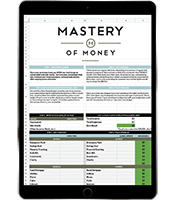In the 1930’s classic Think And Grow Rich, Napoleon Hill states that ‘having definiteness of purpose for acquiring wealth is essential for it’s acquisition.’
The quote lives on the door of my office as a constant reminder that if acquiring wealth is the goal, you must have definiteness of purpose for it’s acquisition – in other words an unwavering focus on that goal happening. I find tracking my net worth on a consistent basis to be one of the best ways to keep that focus.
Visibility Creates Accountability
When you look at the staggeringly low levels of wealth for the majority of society, one can only assume that most people just aren’t thinking much about long-term wealth, opting instead for instant gratification.
In a recent report from Career Builder posted on CNBC.com:
- 78% of full-time workers claim they’re living paycheck to paycheck.
- 71% of those surveyed said they were in debt
- 56% of those surveyed said they were in “over their heads” when it came to their debt levels.
- 10% of those surveyed making over $100,000 a year said it just wasn’t enough.
What clearly won’t be enough is how much most of these households will have for retirement. According to AARP.com, the numbers could be $1-1.5M, 12 times your current income, or at least 90% of your take-home pay pre-retirement for the next 12-15 years.
If this isn’t something you’ve taken a close look at, the geniuses at Nerdwallet.com have created a calculator, of sorts, to help you identify how much you’ll need when you pull the ripcord on your job. (The calculator tells me I’m currently on pace and won’t have to eat cat food when I retire. WooHoo!)
To track your net worth simply and easily there is one application that I find to be better than all others available. After having tried Mint.com, Betterment.com, and a host of others, my allegiance lies with www.PersonalCapital.com.
From the web interface to the mobile application, I find the Personal Capital software to be incredibly robust with features and options, including an alert that informed me my fee range on some mutual funds was way beyond average. (Prompting me to take a closer look and move money to a lower fee index fund.)
The Dashboard features a variety of pieces of information including:
Net Worth: a listing of all open accounts, updated in real-time, showing your to the minute net worth.
Your Investable Cash: If you’re an impulse kind of investor, you never know when having $30-40k to drop at an estate auction will come in handy. (*please don’t do this.)
Market Movers: Most interesting to see on the days when your personal portfolio drops into the negative while the S&P 500 goes up steadily. Index funds anyone?
Cash Flow: Find out in visual form where your money is headed and what percent went where. Our typical responses are, “we spent how much in groceries??” and “should wine have it’s own category?”.
Portfolio Balance: A very helpful chart that shows you 1 day and 30 day percentage changes in your portfolio holdings.
Retirement Planner: This incredible tool runs 5,000 simulations to determine how much you could/should be saving for retirement to hit your net worth goals. I’ve never seen anything like this available on a free piece of web software.
How We Use The Data:
My wife and I have a deep dive conversation about once a month based on the information contained within Personal Capital, typically to monitor our progress and see where our spending was a little more out of control.
The house value data pulls a Zestimate from Zillow which, depending who you ask, could be way high or way low. We consider the equity we have in the house as part of the net worth, but use our home equity a little differently than most people (as described in THIS POST).
That being said, vehicles don’t factor in whatsoever to our overall net worth, nor do household belongings. I’ve been to estate auctions before and your stuff just isn’t worth what you think it is.
We effectively use the data as a measure for where we’re at. Candidly, my wife’s job is funded by grants that aren’t guaranteed and this tool allows us to make some level-headed decisions about future work, upcoming trips, and how many bottles of wine per month we can actually afford.
How Often Should You Look At These Numbers:
Being in the business of teaching financial literacy, I tend to nerd out on my numbers more than the Average Joe. I’m also directing the majority of my own investing so the Personal Capital dashboard is great for me to see how everything is performing in one snapshot. To that end, I’m in the personal capital app at least 3 times a week.
For someone that has an advisor working with them on their investments, I’d say checking in a couple times a month would probably suffice.
And if you’re just getting started in the net worth tracking club due to a limited amount to track, make this a weekly habit of checking in to see how you’re doing. While I fully believe that money isn’t the only or most important thing in life, I desperately want you to have enough in retirement that you can live a comfortable life!
Try out Personal Capital using this link



